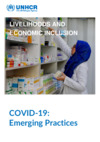Ethiopia: Somali refugees to be relocated away from border
This is a summary of what was said by UNHCR spokesperson Jennifer Pagonis – to whom quoted text may be attributed – at today's press briefing at the Palais des Nations in Geneva.
In Ethiopia today (Friday), UNHCR teams are expected to start relocating a group of 500 newly-recognized Somali refugees who fled from renewed conflict in strife-torn south and central Somalia over the last year. They have been staying around the Kebribeyah area, near the Somali border in eastern Ethiopia and are being relocated to a re-opened UNHCR camp at Teferi Ber.
The refugees are part of a group of 4,000 Somali refugees who have recently been granted refugee status by UNHCR and the government's Authority for Refugees and Returnees Affairs (ARRA). An estimated 7,000 additional Somalis who also claim to have fled fighting and insecurity in Somalia, are waiting to be screened at other sites in eastern Ethiopia.
The new camp site at Teferi Ber, some 120 km north of Kebribeyah, was formerly a UNHCR camp which in the 1990s hosted some 49,000 mainly Somalis refugees who had fled fighting in their country. The camp was officially closed in 2001 after all the refugees returned, mainly to the self -declared republic of Somaliland.
After arriving at Teferi Ber, the refugees will spend three days in a reception centre where they will be allocated plots of land to construct homes and given building materials. They will also be given food as well as tarpaulins, blankets, sleeping mats, kitchen sets, jerry cans, kerosene stoves, and soap. The ARRA has established a temporary health centre until permanent structures can be built.
The Somali Region of Ethiopia already hosts more than 16,500 refugees. With the new arrivals, the total is 20,300. At the peak of the Somali refugee crisis in the early 90s, the region hosted 628,000 refugees in eight camps. The overwhelming majority went home between 1997 and 2005, and all of the camps were closed except a camp at Kebribeyah.
Related news and stories
Thousands of newly arrived Somali refugees in Ethiopia relocated to new settlement
Samira's Story
Drought brings life-threatening food shortages for refugees in Ethiopia
100,000 new Somali refugees arrive in Ethiopia in the past month, UN and partners are calling for urgent funding
UNHCR teams and partners rush assistance to some 100,000 newly arrived Somali refugees in hard-to-reach area of Ethiopia
As the Horn of Africa drought enters a sixth failed rainy season, UNHCR calls for urgent assistance
-

Evaluation of the UNHCR - Government of Colombia Four-Year Plan (2015-2019)
Jun 2020 Attachments: ES/2020/06 Management Response, Spanish version and Executive Summary. (.zip) -

Evaluation of the Ikea Foundation Livelihoods and Energy Projects among Somali Refugees and Host Communities in Ethiopia
Jun 2020 Attachments: ES/2020/02: UNHCR Evaluation Management Response (.zip) -

UNHCR outraged at killings of two refugees and one community member in Niger
1 Jun 2020 -

Projected Global Resettlement Needs 2021 (PDF)
Jun 2020 The Projected Global Resettlement Needs report contains details of the protection environment and refugee profiles in need of resettlement in UNHCR operations globally. It serves as the primary reference document for dialogue on resettlement needs, priorities, likely gaps and challenges in programme delivery, allowing informed decisions on quota and resource allocations. -

High Commissioner's Dialogue on Protection Challenges: Protection and Resilience during Pandemics
During this dialogue, participants reflected upon how to address the pressing protection and solutions questions that have emerged, building upon the international refugee protection regime and principles and arrangements set out in the Global Compact on Refugees. -

Southern Hemisphere winter intensifies hardship for displaced Venezuelans
29 May 2020 -

Northeastern Nigeria camp blaze kills two, leaving thousands without shelter
29 May 2020 -

Winter threatens Venezuelans unprepared for the cold
29 May 2020 As chilly weather steals over South America, vulnerable Venezuelan refugees and migrants brace for added hardship. -

COVID-19 Emerging Practices on Livelihoods and Economic Inclusion
28 May 2020 The COVID-19 pandemic is upending millions of people's lives and devastating health and socio-economic consequences on humans and societies. Many refugees have seen the business they run or work for, often as day workers, forced to close. This document is a snapshot of emerging practices on livelihoods and economic inclusion to respond to the social and economic impacts of the COVID-19 pandemic.
